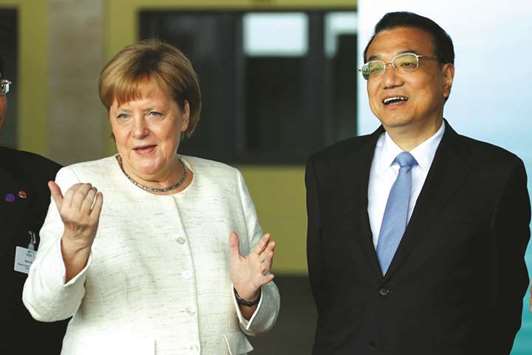Germany’s BASF managed to wrap up a preliminary deal to build China’s first wholly foreign-owned chemicals complex quite quickly, aided in part by trade tensions between Beijing and Washington, sources with knowledge of the matter said.
The proposed complex, worth some $10bn in investment to 2030, will be located in Guangdong, China’s most populous province which had been worried about the impact of a US decision to heavily penalise telecom firm ZTE Corp, also based there.
Fears that a US-China trade war would hurt investment prospects for the business-friendly province made local government officials that much more receptive to overtures by BASF, a global giant with state-of-the art technology, separate people briefed on matter also said.
BASF’s announcement, part of $23bn worth of bilateral deals unveiled as German Chancellor Angela Merkel met Chinese Premier Li Keqiang in Berlin this week is conspicuous for its timing, trade and chemical industry experts said.
In reaching out to Europe, China is showing it is open for business as the trade row with Washington deepens.
BASF’s coup, while still a rare example of a foreign player praising open the Chinese government’s tight control over its energy and chemical industries, also follows measures by Beijing to lift some caps on foreign ownership in the auto and banking sectors.
“Now that we have this trade war that was kicked off last week, Beijing is telling Washington that it is still doing business and that there are capable companies around the world to do business with,” said John Driscoll, director of consultancy JTD Energy in Singapore.
The outcomes of Li’s visit, during which the widow of Chinese Nobel Peace Prize-winning political dissident Liu Xiaobo, left de facto house arrest in China to live in Germany, signalled a measured warming in what has been a bilateral relationship fraught with spying allegations and commercial mistrust.
China this week has also approved a huge new wholly owned Shanghai factory for US electric car maker Tesla Inc, and a $2.3bn joint venture organic light-emitting diode (OLED) plant to be built by South Korea’s LG Display Co Ltd.
In contrast, the Trump administration on Tuesday raised the stakes in the trade dispute, threatening 10% tariffs on a list of $200bn worth of Chinese imports, prompting Beijing to warn it would be forced to retaliate. BASF’s search for a potential site for its second major project in the world’s largest chemical market had been in the works for a while, an industry insider with knowledge of the deal said.
Like other sources, the industry insider declined to be identified due to the sensitivity of the matter.
The German firm had decided to go it alone rather than working with a state-owned partner as it had done previously and chose Guangdong as recently as three months ago, the person said, adding BASF had spied a “window of opportunity”, banking on the province’s desire for cutting-edge technology. The person also said local governments had become more aware that they “cannot not own everything” and foreign investment could help them build what they wanted.

German Chancellor Angela Merkel and Chinese Prime Minister Li Keqiang arrive at a presentation for autonomous driving at Tempelhof airport in Berlin. Germany’s BASF managed to wrap up a preliminary deal to build China’s first wholly foreign-owned chemicals complex quite quickly, aided in part by trade tensions between China and the US, sources with knowledge of the matter said.
